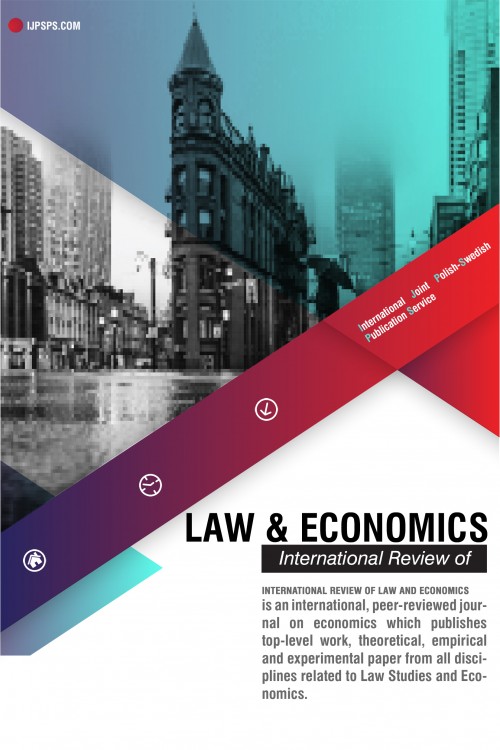
Investigating the Role of Variables Affecting the Legatum Prosperity Index Using Ordered Logit Regression approach
Abstract
one of the main goals of policymakers is to improve the quality of life and increase the level of welfare of society. One of the main indicators of the progress of countries is its prosperity index. Prosperity is more than just the accumulation of material wealth; it is also the joy of everyday life and the prospect of an even better life in the future. This is true for individuals as well as nations. The prosperity index is a function of various variables over time that has been investigated by researchers and institutes, including the Legatum institute. The Legatum Institute exists to promote policies that create pathways from poverty to prosperity. The journey towards prosperity is therefore not just about what we contribute, but about who we become. 2. Theoretical Framework The Legatum Prosperity Index is a framework that assesses countries on the promotion of their citizens’ flourishing, reflecting both wealth and well-being. It captures the richness of a truly prosperous life, moving beyond traditional macroeconomic measurements of a nation’s prosperity, which relies solely on the indicators of wealth such as average income per person (GDP per capita). This makes it an authoritative measure of human progress, offering a unique insight into how prosperity is forming and changing across the world. The Legatum Prosperity Index offers a unique insight into how prosperity is forming and changing across the world. The Index is distinctive in that it is the only global measurement of prosperity based on both income and well-being. Traditionally, a nation’s prosperity has been based solely on macroeconomic indicators such as a country’s income represented either by GDP or by average income per person (GDP per capita). However, most people would agree that prosperity is more than just the accumulation of material wealth. It is also the joy of everyday life and the prospect of being able to build an even better life in the future. In recent years, governments, academics, international organizations, and businesses have increasingly moved their attention toward the indicators that measure well-being as a complement to GDP. Indeed, the Index not only recognizes the need for a country to promote high levels of per capita income but also advocates improvements in the subjective well-being of its citizens. The 2017 Legatum Prosperity Index is based on 104 different variables analyzed across 149 nations around the world. The source data includes Gallup World Poll, World Development Indicators, International Telecommunication Union, Fragile States Index, Worldwide Governance Indicators, Freedom House, World Health Organization, World Values Survey, Amnesty International, and the Centre for Systemic Peace. The 104 variables are grouped into 9 sub-indexes, which are averaged using equal weights. The 9 sub-indexes are: Economic Quality Business Environment Governance Education Health Safety & Security Personal Freedom Social Capital Natural Environment For example, personal freedom includes freedom of speech and religion, and national tolerance for immigrants and ethnic and racial minorities. The Social Capital sub-index includes the percentage of citizens who volunteer, give to charity, help strangers, and who feel they can rely on family and friends. 3. Methodology The present research is attempting to study the effects of different sub-indices on the overall prosperity index in 2015 using the Ordered Logit Regression model. Ordered Logit models are used to estimate the relationships between an ordinal dependent variable and a set of independent variables. According to the ranking of countries by the Legatum Institute to four groups of low-welfare, lower than middle-welfare, higher than middle-welfare, and high-welfare countries, the effects of welfare sub-indices on the overall index are investigated for 142 countries. The dependent variable is the welfare state of the countries, which is classified into four main categories according to the division of the Legatum Institute and the selected explanatory variables including economic, entrepreneurship, governance, education, health, and social capital indicators. 4. Results & Discussion According to the results, we understand that all variables are significant at the level of 10%, but the education index is not significant. On the other hand, health and social indices at the level of 1%, entrepreneurship and government indices at the level of 5%, and the economic sub-index are also significant at the level of 10%. Therefore, due to the significant and positive coefficients of these variables, it is safe to say that these variables have positive and direct effects on prosperity in every country. Therefore, increasing independent significant variables would increase the possibility of countries to higher levels of prosperity and income. 5. Conclusions & Suggestions According to the confirmation of the parallel regression test, the results show that all variables except the education index have a positive and significant effect on the overall prosperity index. In addition, the amount of marginal effect for the health index is the highest and shows that the attention of countries to this sub-indicator is more important in terms of increasing the general prosperity of a country.